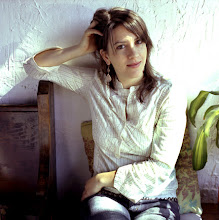 In Nyeleni, I interviewed two young men about a program they had started in a Bamako high school to encourage girls’ education. The program includes a scholoarship program for girls as well as a curriculum about agriculture and agroecology. The idea, as the director of the program explains, is to encourage the girls interested in agriculture as a way to support their interest in working on development in Mali.
In Nyeleni, I interviewed two young men about a program they had started in a Bamako high school to encourage girls’ education. The program includes a scholoarship program for girls as well as a curriculum about agriculture and agroecology. The idea, as the director of the program explains, is to encourage the girls interested in agriculture as a way to support their interest in working on development in Mali.

They arranged for Amadou Diop and Ben Burkett (both from the Federation of Southern Cooperatives) and me to speak to the students at Ecovie, the school that houses the program. I reached deep into my memory of French (I even remember how to say “precautionary principle”!) to give a talk to more than 100 high school kids about what food sovereignty means and why it is relevant to them. We began by asking if any of them knew what the term meant. One bold girl stood up. “It means people in a country being able to feed themselves and have enough to eat before they export all their food.” Not too bad as far as definitions go; that’s certainly a big part of it. Needless to say we were impressed!
Among questions they asked us were whether GMOs held promise to help feed Africa, what a healthy diet is, and what they could do practically to improve the economy and environment in Mali. On the GMO question, we shared with them what we know from our experience with GMOs here in the States: that all of the evidence so far raises serious concerns about the environmental and health impacts of the technology. We also stressed--as folks at the Forum had talked about--that another huge concern about the introduction of genetically modified foods in Africa is that it creates dependence on buying seeds and paying technology fees from the very farmers with the fewest financial resources in the world to do so. We talked about how this would disrupt the age-old traditions of seed saving and sharing that are the building block of successful farming.
Images: That's us, on the dais, and the banner for the talk.

 They arranged for Amadou Diop and Ben Burkett (both from the Federation of Southern Cooperatives) and me to speak to the students at Ecovie, the school that houses the program. I reached deep into my memory of French (I even remember how to say “precautionary principle”!) to give a talk to more than 100 high school kids about what food sovereignty means and why it is relevant to them. We began by asking if any of them knew what the term meant. One bold girl stood up. “It means people in a country being able to feed themselves and have enough to eat before they export all their food.” Not too bad as far as definitions go; that’s certainly a big part of it. Needless to say we were impressed!
They arranged for Amadou Diop and Ben Burkett (both from the Federation of Southern Cooperatives) and me to speak to the students at Ecovie, the school that houses the program. I reached deep into my memory of French (I even remember how to say “precautionary principle”!) to give a talk to more than 100 high school kids about what food sovereignty means and why it is relevant to them. We began by asking if any of them knew what the term meant. One bold girl stood up. “It means people in a country being able to feed themselves and have enough to eat before they export all their food.” Not too bad as far as definitions go; that’s certainly a big part of it. Needless to say we were impressed!